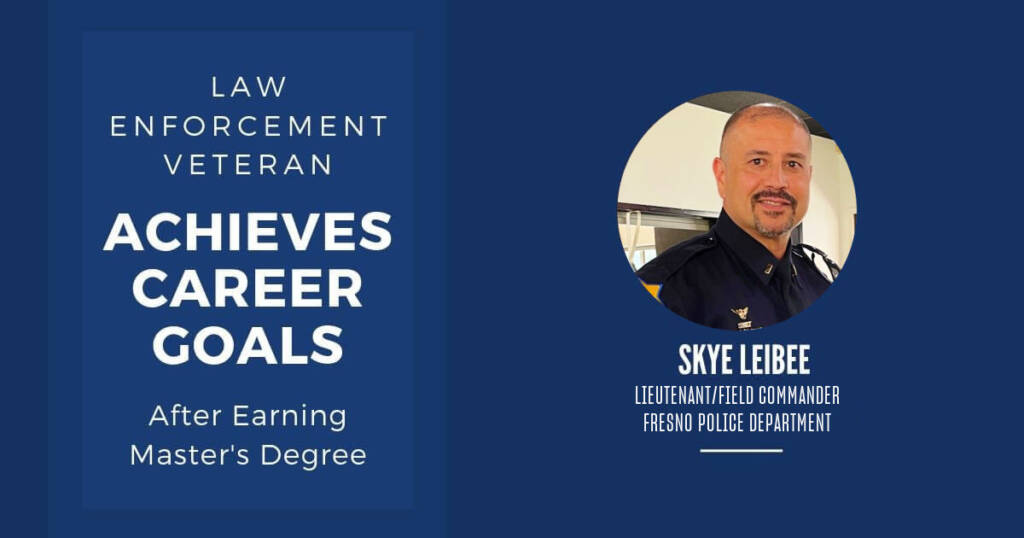If you are a law enforcement officer who aspires to take on a leadership or administrative role, your first opportunity to advance is typically the rank of sergeant. The process to become a police sergeant varies greatly from department to department, but no matter where you serve, there are certain aspects of training, education and the job itself that every officer should know.
To give you first-hand insight into how to become a police sergeant, Dale Fors, patrol sergeant, SWAT team leader and former training manager with the Salinas, California, Police Department shared his insights and career experience. He is a decorated 20-year veteran and an alumnus of the University of San Diego Law Enforcement and Public Safety Leadership master’s degree program.
Sgt. Fors shared invaluable, front-line insights into many aspects of a law enforcement career, from training and education to on-the-job skills and what it takes to become a sergeant.
A Sergeant’s Role & Responsibilities
According to Sgt. Fors, a police sergeant must first and foremost be a true leader, a motivator and someone who exemplifies professionalism. “I believe in the concept of ‘leading from the front’,” he said, “and if you display these traits, most of your officers will want to follow you. They will work hard and they will develop respect for you as a leader.”
To serve as a police sergeant, you typically need at least 5 years of service on the force and must pass an official examination demonstrating your relevant knowledge and skills. As sergeant, you will primarily oversee training and management of other officers, but additional responsibilities can be expected depending on your agency. Sergeants also perform administrative duties, similar to a department manager, but can also perform specialized tasks such as:
- Surveillance
- Follow-up investigations
- Run command at major field assignments (i.e. mass shootings, police shootings, etc.)
- Coach and mentor subordinates
Variations in organizational structure will always depend on the specific department. For example, in the New York Police Department and Chicago Police Department, there is only one level of the sergeant rank, but in the Los Angeles Police Department there are two distinct levels, each with their own job responsibilities.
How to Improve Your Chances of Becoming Sergeant
Seek Out Relevant Training & Assignments
The training and field assignments you get throughout your early career lay the foundation for who you will be as a supervisor. In many instances, you will receive questions from officers looking for guidance about a wide array of policing issues and topics. This can include current case law, policies and procedures, or even obscure federal, local or state laws. By having a broad base of training and knowledge in many areas, you will be able to answer the majority of questions asked by officers or know where to find those answers through research.
According to Sgt. Fors, “Training for new or aspiring sergeants should include critical incident management for supervisors and/or classes related to Incident Command structure (ICS). Both give you rapid decision making skills to use in the field when time is not a luxury.” He explained that “field decisions specifically pertaining to critical incidents require competent leaders who can take charge and make fast choices while allocating and directing necessary resources to end an incident in a safe and effective manner.”
In his career, Sgt. Fors found that two field assignments that benefited him the most were investigations and SWAT. In Fors’ opinion, these two assignments help give an officer a solid understanding of expanded investigative and tactical skills that are invaluable in a supervisory role in which you serve as a guide and mentor to other officers.
Develop a Reading/Education Routine
Beyond formal education, there are many other resources out there for officers to consult to stay up to date on the latest industry news and trends. Sgt. Fors had a few recommendations that he has used throughout his career.
“I frequently utilize a local area district attorney’s publication and the Los Angeles County District Attorney’s ‘One-Minute Brief’ to keep me current on case law updates. I also watch YouTube videos of recent use of force and shooting events to analyze them and stay current with officer safety and tactics. Lastly, I read leadership books such as “Extreme Ownership” by Jocko Willink. The more you read, the more you can formulate and roadmap your own leadership style.”
[RELATED] The Best Police Leadership Books to Have on Your Shelf >>
Prepare for the Promotional Assessment/Boards
To become a police sergeant, you will need to pass a promotional assessment. Every department’s exam process will vary, but most will include an application followed by an invitation for testing. Ultimately, testing typically consists of a state test and an internal policy test. If you receive a passing score, a subsequent testing date may be set in which you will complete a written statement about a “hot topic” facing law enforcement followed by a more comprehensive police assessment center examination. These multifaceted programs are sometimes just referred to as your “assessment center,” and ask you to complete various tasks such as an oral resume review, a deadline-driven exercise, role playing, and a simulation of in a high-pressure scenario where you are in command.
Sgt. Fors recommends taking the assessment center very seriously, as it is the most comprehensive component of your examination. “Fundamentally, an assessment center will aim at evaluating how effectively candidates can use written and verbal communication, how well they can work within a group of peers in a leadership role, their time management, critical thinking and/or skills pertaining to presentations, and their professional diffusion tactics.”
In order to prepare for this testing process, you should read and study any materials provided for the testing process, speak to others who have taken the test to get tips and conduct mock interviews with peers and or family members. For Sgt. Fors, this is the most important preparation tactic. “In my opinion, conducting mock interviews and ‘live scenarios’ with others prior to actual testing will make you feel more comfortable speaking in front of others, and allow you to formulate better answers as you think through the questions being asked.”
Pursue Educational Opportunities
Pursuing formal education as a police officer in any role, not just as a sergeant, can help in many different ways. Whether it’s improving your writing ability, growing your network or simply adding to your knowledge, a formal education will help you become more well-rounded, confident and prepared for both the promotional process as well the job responsibilities of being a sergeant.

“In my experience, my bachelor’s degree program provided a good base foundation of general policing practices,” said Sgt. Fors. “Then, USD’s law enforcement leadership master’s degree program refined my ability to communicate, network and formulate responses and opinions on the most crucial topics facing modern day policing.”
While a master’s degree is not generally required to be a police sergeant, it can help expand your skill set, improve your odds of advancing up the career ladder, or even increase your salary. A master’s degree can help you develop as a leader, by teaching new skills in areas like conflict resolution, community relations, resource planning and complex legal issues, which will likely give you a competitive edge in the promotional process.
Skills Needed to Be an Effective Supervisor or Sergeant
There are many skills required of effective police sergeants, both at an interpersonal level and in terms of tactical skills. Like any good supervisor, a police sergeant should be versatile, adaptable and patient. In many instances, a sergeant deals with situations that are uncommon and challenging, and these traits will be critical. Such instances might include personality issues with officers, work ethic issues, conflict among officers and community relations issues in which emotions run especially high.
Sgt. Fors believes an effective sergeant should possess the following five qualities:
- Be an effective communicator
- Be organized
- Be a good listener
- Be able to hold others accountable
- Be a good teacher
A sergeant also needs to be a good negotiator and mediator. “In many instances, a sergeant not only has to implement the administrative goals of a department, but must also protect and defend patrol officers from politics and unreasonable requests for duty,” said Sgt. Fors. “This can and will be challenging.”
Sgt. Fors, in his two decades on the force, has seen his many patrol officers advance through their departments and move into leadership roles. In his own experience as both an officer and a mentor, he has given and received his fair share of valuable advice for aspiring police sergeants:
- Always look ahead to the next level. With this goal in mind, you will always strive to do your current job beyond expectations.
- Be patient. Being a leader takes time and hard work. It will be easy to get frustrated, but you can’t give up.
- Be eager. Those who want the “ball” will be more likely to get it. Administration likes those who are willing and eager to take on tasks and solve problems for the department.
Finally, Sgt. Fors recommends that officers consider pursuing their master’s degree because it will help prepare them for the different roles and responsibilities expected of a police sergeant. “Receiving my master’s degree in Law Enforcement and Public Safety Leadership gave me a clear understanding of the administrative functions and required vision of command staff officers, which has given me the ability to convey and convince line officers of departmental changes and orders. This also can allow a sergeant to be more objective and be a participative leader at all levels.”
Chief Jose Tellez of the National City Police Department agrees. “If you have any aspirations to be a supervisor or work in management, then you definitely should get your master’s degree,” he advises. “There are too many things that are impacting our profession – not only the internal politics of government, but outside influences like technology, economy, community relations. I’m doing some things today in my job I had no idea I would be doing, especially in the area of technology. I had to learn those things. If you have obtained a formal degree you are better able to cope and handle the challenges that you will face as a leader in an organization.”





